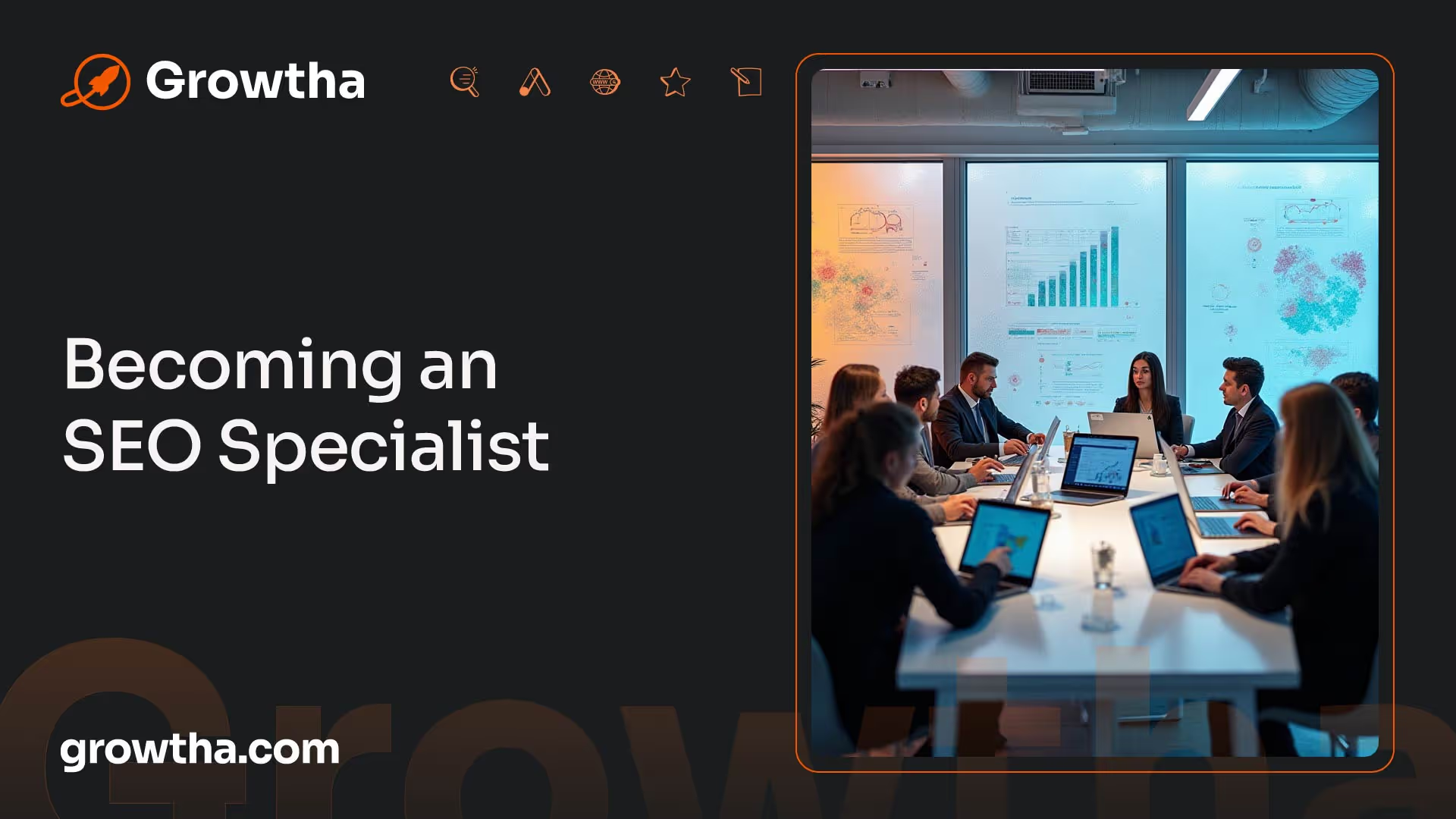How to Become an SEO Lead in Healthcare
Becoming an SEO specialist requires a combination of educational requirements and skills development.


How to Become an SEO Lead in Healthcare
Becoming an SEO Specialist

Becoming an SEO specialist requires a combination of educational requirements and skills development. This section will explore the necessary steps to embark on a career as an SEO specialist.
Educational Requirements
To start a career as an SEO specialist, a bachelor's degree is typically expected. While various educational backgrounds can be suitable for this field, degrees in marketing or information technology (IT) are particularly relevant. These degrees provide a solid foundation of knowledge and skills that can be applied to SEO practices [1]. Communication education degrees can also be applicable for this career path [1].
During your bachelor's degree, it is recommended to take elective classes in computer applications, web design, and related topics. These courses enhance computer literacy, which is essential for success in the SEO field. Additionally, gaining hands-on experience through internships is highly encouraged to develop practical skills and deepen your understanding of SEO techniques [1].
To further enhance your expertise, pursuing a master's degree in marketing or IT can provide you with a broader range of skills and knowledge. However, a master's degree is not always a mandatory requirement to enter the field of SEO.
Skills Development
In addition to formal education, developing specific skills is crucial to becoming a successful SEO specialist. Here are some key skills to focus on:
- Analytical Skills: SEO specialists must possess strong analytical skills to evaluate website performance, conduct keyword research, and analyze data to make informed decisions.
- Technical Skills: Proficiency in various technical aspects, such as website coding, content management systems, and search engine algorithms, is essential for optimizing website structure and ensuring its visibility.
- Keyword Research: A thorough understanding of keyword research techniques allows SEO specialists to identify high-value keywords and create targeted content that aligns with user intent.
- Content Creation and Optimization: SEO specialists should possess excellent writing skills to create engaging and optimized content that appeals to both search engines and users.
- Data Analysis: The ability to interpret and analyze website analytics data using tools like Google Analytics helps SEO specialists track performance, identify trends, and make data-driven decisions.
- Communication Skills: Strong communication skills are vital for collaborating with cross-functional teams, explaining SEO strategies, and effectively conveying recommendations to clients or stakeholders.
- Continuous Learning: SEO is a dynamic field, constantly evolving with new algorithms, trends, and techniques. SEO specialists should have a thirst for knowledge and a commitment to continuous learning to stay up-to-date with industry changes.
By combining a strong educational foundation with the development of these essential skills, aspiring SEO specialists can position themselves for success in this ever-growing field.
Advancing in the SEO Field

As an SEO specialist in the healthcare industry, there are various paths to advance your career and take on more challenging roles. Two common avenues for career growth in the SEO field are transitioning to managerial roles and pursuing specialization and certifications.
Transitioning to Managerial Roles
For professionals looking to take on leadership positions, transitioning to managerial roles can be a natural progression in their SEO career. Becoming an SEO manager involves overseeing SEO efforts, coordinating onsite and offsite optimization, conducting keyword expansion research, and ensuring the success of paid search campaigns [2].
To transition into a managerial position, it is essential to develop not only strong technical SEO skills but also excellent communication and collaboration abilities. An SEO manager needs to effectively communicate with various teams, stakeholders, and clients. Additionally, staying up-to-date with the latest SEO practices and techniques is crucial for success in this role.
Specialization and Certifications
Another way to advance in the SEO field is by specializing in specific areas and obtaining relevant certifications. By focusing on a particular aspect of SEO, such as local SEO, technical SEO, or content marketing, you can position yourself as an expert in that domain.
Specializing in a specific area allows you to deepen your knowledge, develop specialized skills, and differentiate yourself in a competitive job market. It also opens up opportunities to work on more complex projects and collaborate with teams across different departments.
To enhance your specialization, pursuing industry-recognized certifications can be beneficial. Certifications provide validation of your expertise and demonstrate your commitment to professional development. Some popular certifications in the SEO field include Google Ads certification, Google Analytics certification, and HubSpot Content Marketing certification.
By combining specialization with certifications, you can strengthen your credentials and increase your chances of advancing in your SEO career.
Advancing in the SEO field requires continuous learning, staying ahead of industry changes, and gaining practical experience. By exploring managerial roles and pursuing specialization and certifications, you can take your SEO career to new heights in the dynamic and ever-evolving healthcare industry.
Staying Updated in SEO

In the fast-paced world of SEO, staying updated on the latest trends and techniques is essential for success. As an SEO professional in the healthcare industry, it's important to continuously expand your knowledge and keep up with industry advancements. Here are several effective strategies to stay informed and ahead of the curve.
Industry Publications and Blogs
Reading SEO publications and blogs is a valuable way to stay updated on industry news and best practices. Some prominent publications to consider include Search Engine Land, Search Engine Roundtable, Semrush, Ahrefs, Moz, and Google Search Central Blog. Subscribing to newsletters from these publications can provide you with daily updates on the latest SEO trends and insights [3].
Webinars and Video Resources
Utilizing webinars and video resources can offer valuable insights into specific aspects of SEO, industry news, and fresh tactics. Pre-recorded webinars available on platforms like YouTube, administered by brands and thought leaders, provide on-demand knowledge and guidance. These resources allow you to learn at your own pace and delve deeper into topics of interest [3].
Podcasts for Industry Insights
Following SEO and digital marketing-focused podcasts can be an educational way to stay informed about industry trends. Podcasts have evolved into valuable content resources covering various topics, including SEO. Listening to podcasts during your commute or while exercising can provide you with insights from industry experts and keep you up to date with the latest strategies and techniques [3].
Engaging with Thought Leaders
Engaging with SEO thought leaders on platforms like Twitter and LinkedIn can provide you with real-time tips and tricks. Following industry experts allows you to stay updated and inspired to implement innovative strategies. Thought leaders often share valuable insights, case studies, and industry news, making it important to actively engage with their content and participate in discussions whenever possible.
Online Communities for Discussion
Participating in online groups and communities within the SEO industry can facilitate discussions, engagement, and troubleshooting. Platforms like WebmasterWorld, Webmasters Stack Exchange, SEO Forum, and the Moz community are excellent places to connect with fellow SEO professionals, ask questions, and share knowledge. Engaging in these communities not only helps you stay updated but also allows you to learn from others' experiences and contribute to the growth of the SEO community [3].
By actively incorporating these strategies into your routine, you can stay ahead in the ever-evolving field of SEO. Continuously seeking out new knowledge, engaging with industry experts, and participating in discussions will help you refine your skills and ensure that you are always up to date with the latest trends and best practices.
Salary and Career Growth

When it comes to pursuing a career as an SEO lead in the healthcare industry, salary and career growth are important factors to consider. Let's explore some insights into average salaries and career progression opportunities for SEO specialists.
Average Salary Insights
The salary of an SEO specialist can vary based on factors such as location, experience level, work environment, and whether working in-house or at an agency. According to data from 2019, the average salary of an SEO specialist was $52,590, with more senior SEO managers earning an average of $87,267 per year.
In India, the basic annual salary for an SEO specialist is approximately INR 4,34,000. It's important to note that salary ranges can vary depending on location and other factors.
Career Progression Opportunities
The SEO career path typically moves from entry-level positions to more experienced and senior roles. As an SEO specialist gains knowledge, skills, and experience in the field, they can progress to positions such as SEO manager or SEO lead.
Career progression in the SEO field is often accompanied by increased responsibilities and higher salary potential. According to Search Engine Land, the salary range for an SEO manager is typically between $80,000 and $120,000 per year. However, it's important to keep in mind that salary ranges may vary based on location and other factors.
In addition to traditional career progression, the field of SEO offers opportunities for specialization and growth in specific areas such as technical SEO, content marketing, or local SEO. By developing expertise in a particular niche, SEO professionals can enhance their value and open doors to more advanced positions.
To stay competitive and continue growing in the SEO field, professionals can pursue certifications and attend industry conferences or workshops. These opportunities provide valuable knowledge, networking, and recognition within the SEO community.
As the demand for SEO specialists continues to grow, it's worth noting that there are over 207,000 people on LinkedIn with SEO-related titles, and the demand for SEO courses has increased significantly in recent years [6]. This indicates a positive outlook for career opportunities and the continued importance of SEO in the digital landscape.
By continuously learning, staying updated with industry trends, and leveraging opportunities for professional development, SEO specialists in the healthcare industry can unlock rewarding career growth and advancement.
Tools and Resources for SEO Professionals
To excel as an SEO professional in the healthcare industry, it's crucial to leverage the right tools and resources. These can help you effectively manage SEO campaigns, stay updated on industry trends, and continuously adapt your strategies. In this section, we will explore essential tools for SEO management and the importance of continuous learning and adaptation.
Essential Tools for SEO Management
SEO experts rely on various tools to streamline their workflows, gain insights, and optimize their strategies. Here are some essential tools commonly used by SEO professionals:

These tools offer valuable data and insights to optimize website performance, conduct keyword research, monitor rankings, and track the success of SEO campaigns. By utilizing these tools effectively, SEO professionals can make informed decisions and drive valuable organic traffic to healthcare websites.
Continuous Learning and Adaptation
The SEO landscape is constantly evolving, with search engines regularly updating their algorithms and best practices. To stay ahead in the industry, SEO professionals must prioritize continuous learning and adaptation. Here are some key ways to achieve this:
- Reading SEO Publications and Blogs: Keeping up with industry news and best practices is essential. Reputable publications and blogs like Search Engine Land, Search Engine Roundtable, Semrush, Ahrefs, Moz, and the Google Search Central Blog provide valuable insights and updates. Subscribing to their newsletters can ensure you receive daily updates on the latest trends and developments.
- Attending Webinars and Video Resources: Webinars and video resources offer a convenient way to learn from industry experts. Many SEO professionals and organizations host webinars that cover a wide range of SEO topics. These resources provide valuable insights, tips, and strategies to enhance your SEO knowledge and skills.
- Listening to Podcasts: Podcasts can be a great way to stay updated on the latest SEO trends and gain insights from industry experts. There are numerous SEO-focused podcasts available, offering valuable information and discussions on various SEO topics.
- Engaging with Thought Leaders: Engaging with thought leaders in the SEO industry through social media platforms, forums, and online communities can provide opportunities for learning and networking. Following influential figures and participating in discussions can expand your knowledge and keep you connected with the latest industry trends.
- Joining Online Communities: Online communities, such as forums and social media groups, offer a platform for SEO professionals to connect, share insights, and discuss challenges. Engaging in conversations within these communities fosters a collaborative environment and provides opportunities for knowledge sharing and learning from peers.
By continuously learning and adapting to changes in the SEO landscape, healthcare SEO professionals can stay at the forefront of the industry, implement effective strategies, and drive organic traffic to healthcare websites.
Diverse Backgrounds in SEO
The field of SEO (Search Engine Optimization) attracts professionals from a wide range of backgrounds, showcasing the diversity of expertise in the industry. SEO specialists can come from various fields such as programming, entrepreneurship, traditional marketing, journalism, and even surprising backgrounds like former rappers. This diversity brings a unique blend of skills and perspectives to the field, contributing to its continuous growth and innovation.
Varied Career Paths
Historically, many SEO professionals did not plan on pursuing SEO as a career until the late 1990s and early 2000s, coinciding with the rapid evolution of the worldwide web. Opportunities to help brands and individuals in new ways emerged, leading to the rise of SEO as a specialized field [8]. As a result, professionals from a variety of backgrounds found their way into SEO, bringing their unique experiences and knowledge to the table.
Teachers, journalists, individuals with math-focused professions, and those with traditional marketing backgrounds have all found success in the SEO field. This diversity of career paths highlights the versatility and adaptability required in the ever-changing landscape of SEO.
Essential Skills for Success
While there is no one-size-fits-all set of skills for SEO professionals, certain attributes and competencies are essential for success in this field. These skills include:
- Critical Thinking: SEO professionals must possess strong critical thinking skills to analyze data, identify trends, and make informed decisions to optimize websites for search engines.
- Communication Skills: Effective communication, both in speaking and writing, is crucial for SEO professionals to collaborate with cross-functional teams, convey strategies, and present insights to clients or stakeholders.
- Technical and Programming Skills: A solid understanding of technical aspects is necessary to effectively communicate with developers, assess coding implications, and offer insights on page speed, rendering, server-side redirects, and HTML tagging [7]. These skills enable SEO professionals to optimize websites for better search engine visibility.
- Social Skills: Building relationships and networking within the industry are important for SEO professionals to stay updated on the latest trends and developments. Collaboration and effective teamwork are also essential when working with colleagues and clients.
- Analytical Skills: SEO professionals need to be proficient in analyzing data, using tools and platforms to monitor website performance, track keyword rankings, and identify areas for improvement.
- Data Skills: The ability to interpret and draw insights from data is crucial in SEO. SEO professionals should be comfortable working with various analytics tools and platforms to make data-driven decisions.
- Drive, Motivation & Adaptability: SEO is a dynamic field that constantly evolves. SEO professionals must be motivated to stay up to date with industry changes, adapt to new algorithms, and continuously learn and refine their strategies.
- Sense of Humor: While not a technical skill, having a sense of humor can help SEO professionals navigate the challenges and complexities of the field while maintaining a positive and creative mindset.
By embracing the diversity of backgrounds and fostering a combination of these essential skills, SEO professionals can thrive in their roles and contribute to the success of healthcare SEO marketing efforts.
References
[1]: https://www.gcu.edu/blog/business-management/how-become-seo-specialist
[2]: https://resources.workable.com/seo-manager-job-description
[3]: https://searchengineland.com/stay-on-top-latest-seo-trends-433900
[4]: https://brainstation.io/career-guides/how-to-become-an-seo-specialist
[5]: https://emeritus.org/in/learn/what-are-the-roles-and-responsibilities-of-an-seo-specialist/
[6]: https://seotactica.com/seo/seo-job-titles/
[7]: https://www.searchenginejournal.com/top-seo-skills/229623/







